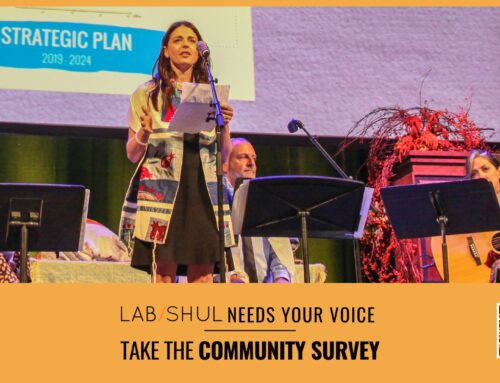5778 Yom Kippur Remarks
Sarah Sokolic, Lab/Shul Executive Director
Is it just me or could anyone else use a cup of coffee right now? Sorry, Yom Kippur, I know.
Speaking of coffee, I just learned about the Starbucks mobile app where you can order and pay for your coffee ahead of time and it’s ready waiting for you to pick up whenever you arrive. Apparently this pre-pay app has been around for a couple of years already but it’s new to me and it’s kind of amazing. That said, I’m clearly the old-school shnook who stands in line to order, makes eye contact and smiles at the cashier, leisurely dips my credit card and then patiently waits for my order to be made. Meanwhile others swoop in and out of the door to pick up their perfectly tailor-made coffees like they’re on a caffeine-deprived drive-by. Please forgive all this coffee talk on Yom Kippur – I’m trying to make a point.
We live in a time of transactions. Everything is accessible at the click of a mouse or the tap of a thumb. We want what we want when we want it AND we are totally entitled to have that expectation. We click, we get. Done. It’s the privileged, unwritten contract so many of us have with this moment in our society.

I’m proud of so much of what we’ve developed and put forward out to the world – ritually, spiritually and educationally. But in my new role as Executive Director I’m really wrestling with our model of belonging – financially and administratively. It too often feels as transactional as a mobile pre-pay app, and that somehow, we are missing the metaphoric eye contact that goes beyond the transaction of, say, typing in the numbers of your credit card to pay for your high holy day tickets online.
This is the classic pitfall for synagogues and other spiritual communities at this moment in our society. Transaction versus Interaction. Over the past few years small task forces of our board and co-creators have helped us to experiment with different models of membership and fundraising. But in some ways we’ve fallen into that classic non-profit cycle of Ask, Hope, Receive, Thank and Repeat. Not super innovative at all. But we can do better and we will.
What would it look like if we were able to move from a “contractual” relationship with our community – where each end must hold up an end of a bargain – to a “covenant” relationship, where both parties agree to hold up their ends regardless of whether the other party keeps their part of the agreement. A contract is conditional. You give me this, I give you that. A covenant is unconditional and gives all of us much more of a chance to meet our full potential.
With this in mind, I challenge us to think of each of our own contributions to our community as Investments versus Donations. With an investment there is no guarantee. An investment could pay off in spades or maybe it won’t at all. There is risk involved. It’s not a contract with specific terms that are carefully outlined. It’s taking a share in something based on trust, commitment and intuition. We invest in real estate. We invest in our children’s education. We invest in relationships.

Lab/Shul, five years in, has honed its skill in experimenting the best ways to meet the needs of our community. We have raised the bar on the B-Mitzvah experience for 75 families. We have provided unique and meaningful High Holy Day experiences for more than 16,000 people and touched the lives of thousands more through our Shabbat and holiday events and justice work. We have high demand for our programming and are poised for growth. We now need your investment to prepare and scale for it.
Will you invest in – not simply pay for – high holy day experiences that don’t require a credit card transaction?
Will you invest in – not simply fund – a physical space to produce our programming that provides a both a spiritual and, yes, even a financial return?
Will you invest in – not simply donate to support the salaries of – the human capital that is the inner-working machinery of this sacred community?
Let us invest in ourselves. Let us not sell ourselves short. Let us not fall victim the state of traditional transactional religious life in today’s America. Let us think differently about tomorrow. Let us be builders, not buyers. Let us see Lab/Shul 5, 10, 20 years from now as a pillar of strength in the American landscape of spiritual communities – Jewish – and beyond.














